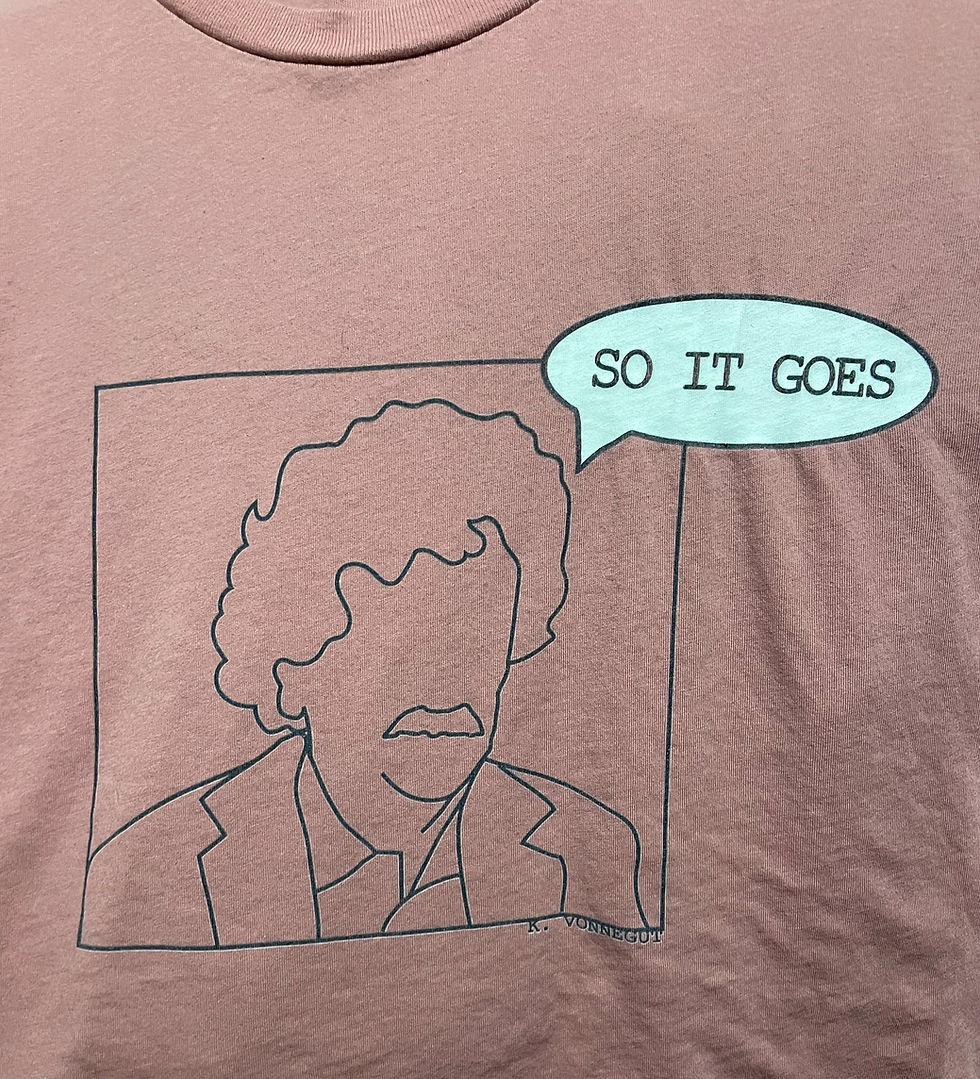This blog post was inspired by the various ways in which our country honored Veterans Day this past weekend, and especially by listening to my own dear veteran reminisce about his service.

To represent my favorite author, Kurt Vonnegut, Jr., I wore the pictured shirt on Veterans Day. Vonnegut was a veteran of World War II and spent time as a prisoner of war in Dresden, Germany. My t-shirt features his silhouette and a famous quote from Slaughterhouse-Five, the book based on his WWII experiences: “So it goes.” Vonnegut was deeply affected by his experiences, and he repeats this short phrase throughout the book to emphasize the horrors of war in his own absurd yet straightforward way. For example:
His mother was incinerated in the Dresden fire-storm. So it goes. (Vonnegut 1969, 2).
He would later hang himself while awaiting trial as a war criminal. So it goes. (Vonnegut 1969, 128).
It was alright, somehow, his being dead. So it goes. (Vonnegut 1969, 148).
The rest of the guards had, before the raid began, gone to the comforts of their own homes in Dresden. They were all being killed with their families. So it goes. (Vonnegut 1969, 177).
Although his “So it goes” explanation of atrocities may seem irreverent, it gives the reader a glimpse into the mental health of a veteran who witnessed the Allied carpet bombing of Dresden and was forced to clean up after the resulting death and destruction. Not for the faint of heart, Slaughterhouse-Five details what Vonnegut saw, heard, smelled, and felt during that gruesome assignment. And how does Vonnegut explain that horrific experience? Fire-storms, incinerated bodies, stealing from the dead? “So it goes.”
Like Vonnegut, America’s veterans have historically been expected to neatly file away the nightmares of war and assimilate back into “normal” life with no mental health hiccups along the way. Veterans of our most recent wars have seen schools bombed, IEDs kill their comrades, and enemies that hide in plain sight. Experiencing Post-Traumatic Stress Disorder (PTSD) when you return home? Sorry. That’s what you enlisted for. “So it goes.”
As a nation, we finally seem to be understanding the toll that deployments and war take on our veterans’ mental health. Veterans Day ads and posts this year included information about getting help for PTSD and other mental health issues. If you have veterans in your life who appear unphased by their time overseas, who seem “tough enough” to handle whatever they experienced, please recognize that those may be Vonnegut-like masks they wear to hide their true emotions and memories. Dig deeper than “So it goes” with them and explain how the Department of Veterans Affairs (VA) can help them (The Pact Act: The PACT Act And Your VA Benefits | Veterans Affairs.) If they’re really struggling, refer them to the Veterans Crisis Line:
Or, to speak with someone, dial 988, then press 1.
Because I feel the need to tie this post to the craft of writing and editing, consider the power of repetition, as used by Vonnegut in Slaughterhouse-Five. Three little words, used over and over, made a huge impact on this reader. How can repetition help you get your message across?
Be sure to visit Home | StephB-Editing soon for the latest blog post.
References
Vonnegut, Kurt. 1969. Slaughterhouse-Five. New York: Dell Publishing.

Comentários